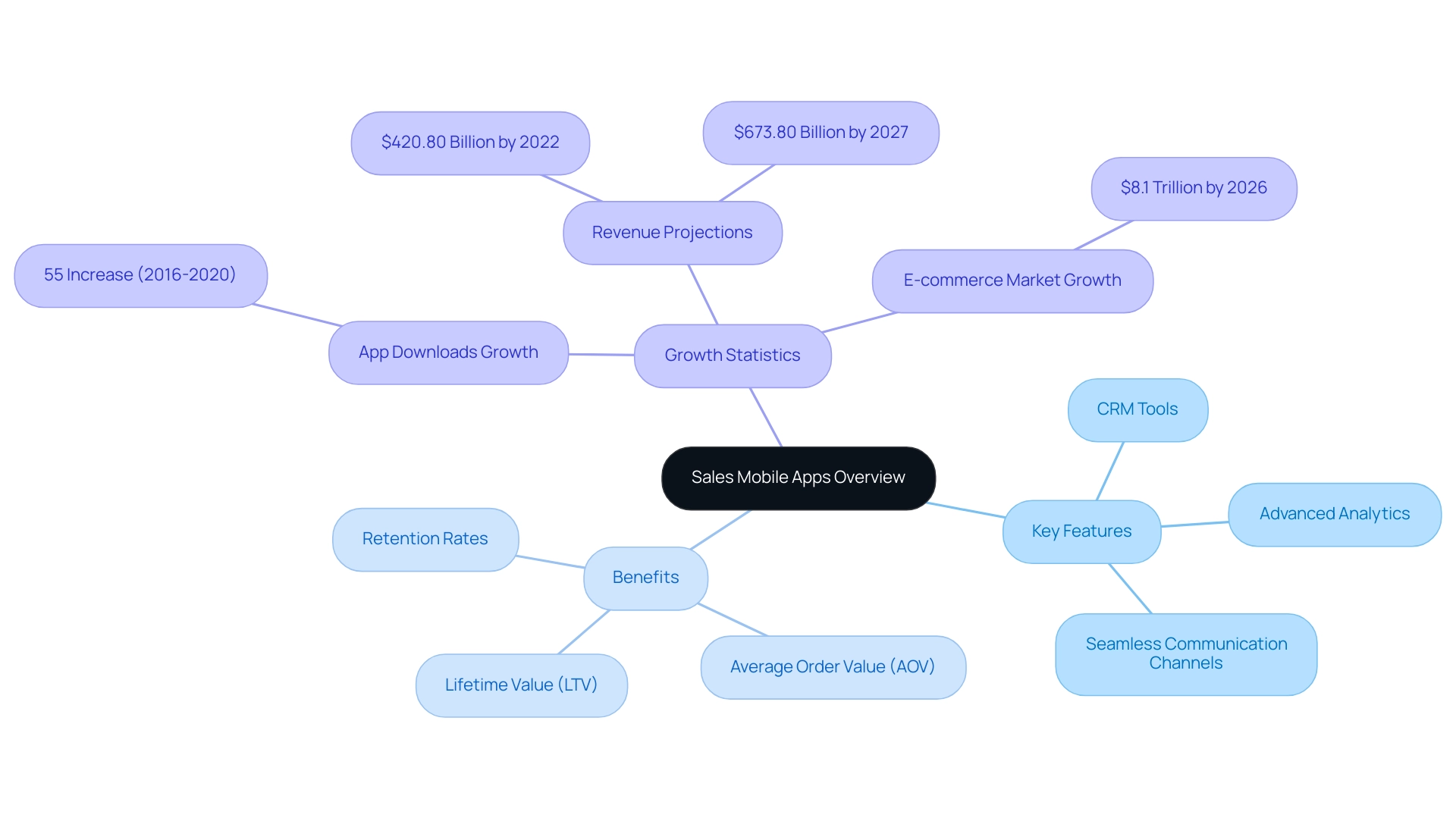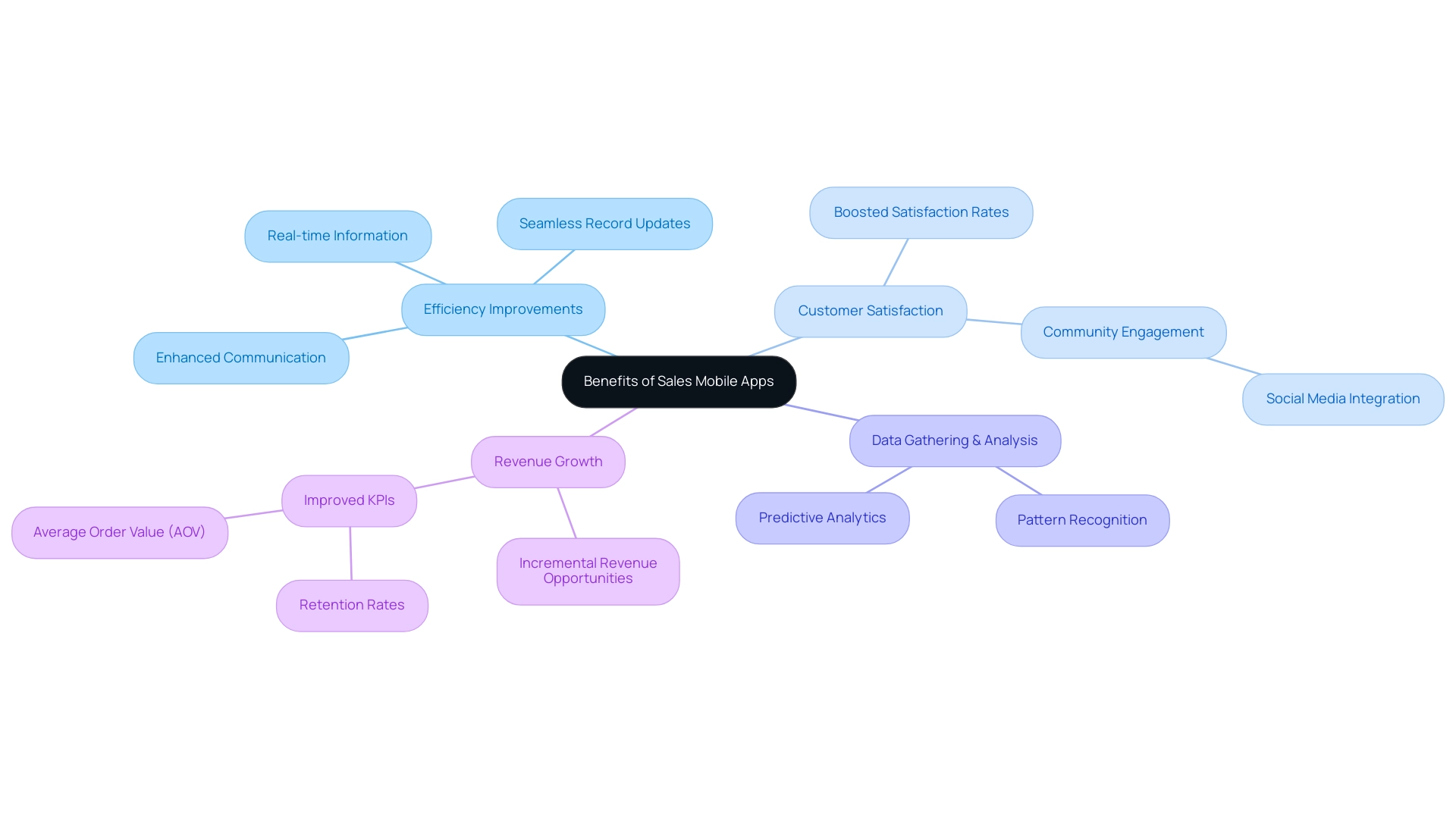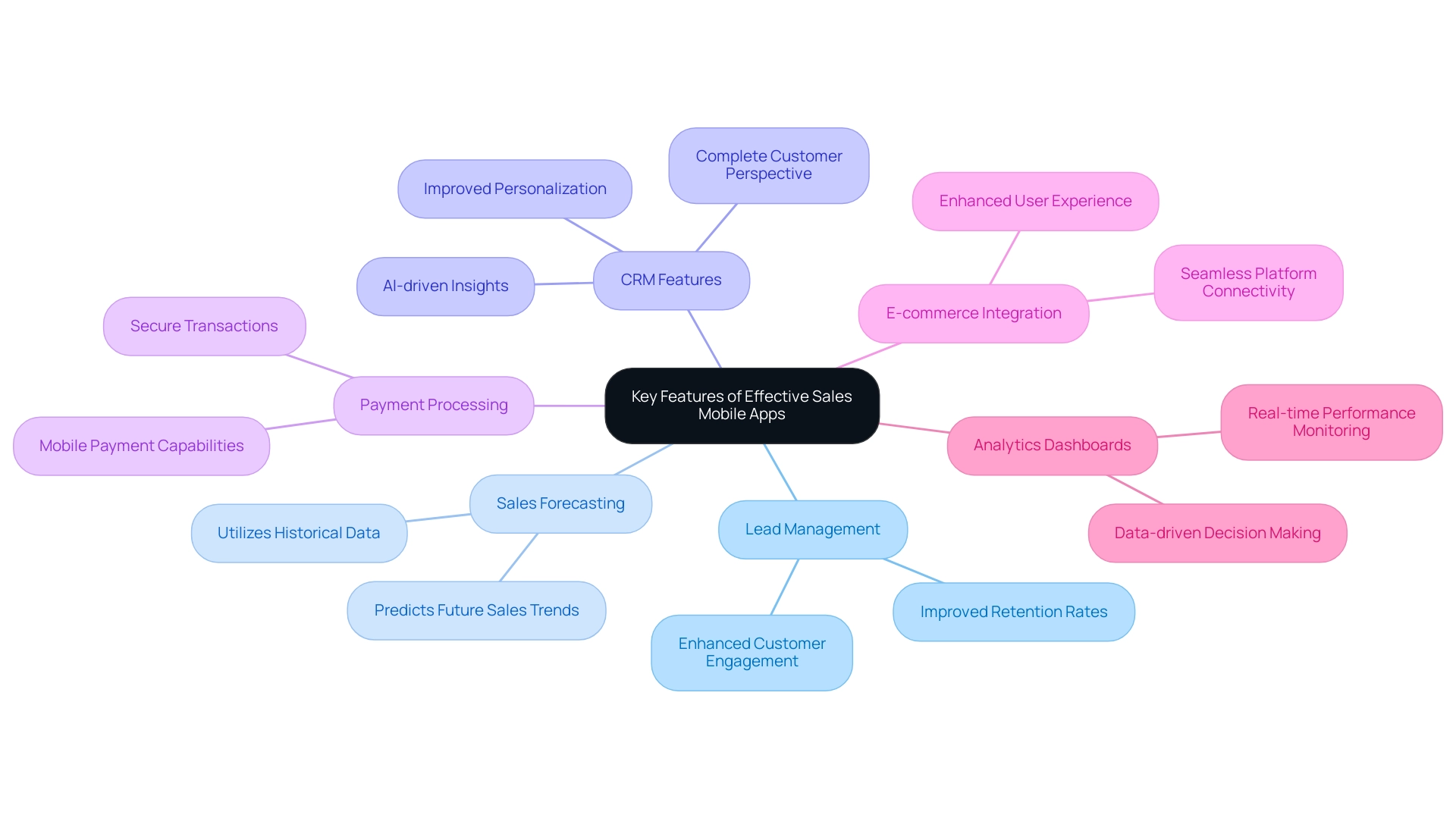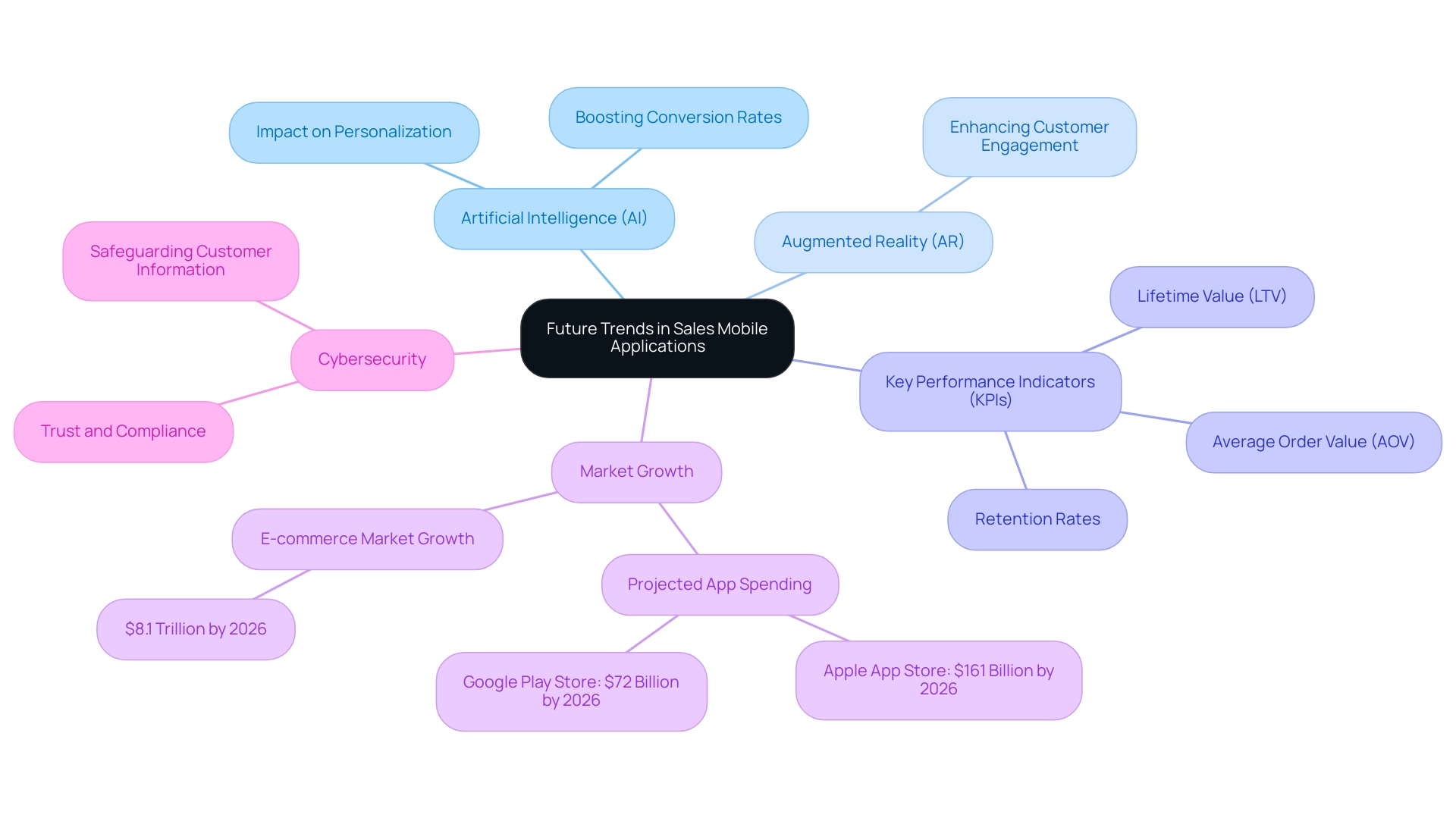Introduction
In an increasingly mobile-driven world, sales mobile applications have emerged as pivotal tools that redefine how businesses engage with customers and streamline their sales processes. These innovative solutions not only enhance customer relationship management but also empower sales teams to operate with unprecedented agility and efficiency. As the mobile app market continues to expand, with projections indicating substantial growth in both downloads and revenue, organizations must embrace these technologies to remain competitive.
The integration of advanced features such as AI-driven insights, real-time analytics, and seamless communication channels positions sales mobile apps as indispensable assets for driving revenue and fostering community interactions.
This article delves into the transformative impact of sales mobile applications, exploring their benefits, key features, and the future trends that will shape the e-commerce landscape.
Defining Sales Mobile Apps: An Overview
Sales mobile apps have emerged as essential tools designed to enhance the selling process across various industries. By supporting customer relationship management, monitoring leads, and enabling deal closures directly from portable devices, sales mobile apps empower sales groups to function with agility and efficiency. Backed by over 20 years of unparalleled experience, our tailored e-commerce solutions significantly improve critical KPIs such as:
- Retention rates
- Average Order Value (AOV)
- Lifetime Value (LTV)
This ensures that businesses not only adapt but thrive in a competitive landscape.
The importance of this technology is emphasized by the remarkable rise in app downloads, which experienced a 55% increase from 2016 to 2020, showcasing the growing dependence on portable solutions in commerce. As MobiLoud observed,
In 2021 alone, 2 million new applications were created,
reflecting the vibrant ecosystem that supports innovation in devices. In this context, our applications for commerce integrate vital features such as:
- CRM tools
- Advanced analytics
- Seamless communication channels
These features effectively streamline workflows and boost overall productivity while mapping directly to your internal goals.
Furthermore, our solutions help users win by driving engagement and fostering community interactions, which are crucial for long-term success. The application market is anticipated to produce $420.80 billion in revenue by 2022, with forecasts to expand to $673.80 billion by 2027. This growth highlights the significance of application development, especially as the e-commerce market is expected to reach $8.1 trillion by 2026.
Thus, the role of mobile technology in transaction processes is not just beneficial; it is becoming essential for businesses aiming to build community value and achieve long-term success.

The Benefits of Sales Mobile Apps for Businesses
Sales mobile apps are transforming the environment for companies, offering numerous benefits that enhance efficiency and customer contentment. With a proven track record of improving critical KPIs, such as retention rates and Average Order Value (AOV), these tailored solutions, particularly sales mobile apps, are essential for e-commerce success. These applications are specifically designed to meet the unique needs of each client, ensuring that they align with internal goals and KPIs.
In 2021, mobile devices represented 55% of all website views, highlighting the necessity of mobile accessibility for teams to adapt their strategies effectively. These sales mobile apps empower representatives with real-time information, enabling them to update records seamlessly and respond promptly to customer inquiries, which significantly boosts customer satisfaction rates. A notable example is Vaiva, a travel platform that successfully integrated social media features, thereby enhancing user engagement and fostering a community within the app.
Furthermore, the integration of AI agents into sales mobile apps and other portable commerce tools can further optimize processes, enabling predictive analytics and tailored customer interactions that improve sales strategies. Additionally, sales mobile apps enhance data gathering and examination, enabling companies to recognize patterns and make knowledgeable choices that propel strategic planning. These tailored solutions not only enhance communication with clients and build community value but also create opportunities for incremental revenue growth.
As MobiLoud observed, 'In 2021 alone, 2 million new programs were developed,' reflecting the rapid expansion and significance of portable solutions in today's market. Overall, the strategic integration of sales mobile apps is essential for contemporary businesses, driving revenue growth and enhancing overall performance.

Key Features of Effective Sales Mobile Apps
To succeed in today’s competitive e-commerce environment, effective mobile applications must include several key features designed to enhance critical KPIs. Our solutions have a proven track record in this area, enabling businesses to significantly improve retention rates and boost Average Order Value (AOV), ultimately contributing to incremental revenue growth. A primary component is the integration of lead management systems, which empower teams to track potential customers through the purchasing funnel, facilitating timely follow-ups and engagement.
Sales forecasting tools add further value by utilizing historical data to predict future sales trends, allowing businesses to make informed decisions while reshaping community interactions. Furthermore, extensive customer relationship management (CRM) features are essential, as they offer teams a complete perspective of customer interactions, history, and preferences, improving personalization efforts and fostering community value.
For instance, successful deployments of our solutions have resulted in notable revenue growth for clients, such as [specific case study or example], showcasing the effectiveness of customized portable software. YouTube's dominance in video podcasts illustrates how successful platforms can leverage effective features to engage users and drive revenue. This underscores the importance of innovative functionalities in applications, particularly as the app landscape surged with 2 million new launches in 2021, highlighting the need for customized solutions.
Essential features also include:
- Payment processing capabilities for smartphones
- Seamless integration with e-commerce platforms
- Analytics dashboards that monitor performance metrics in real-time
The importance of these tools is demonstrated in the statistic that 54% of organizations attribute partnerships as a source of over 20% of their revenue, highlighting the influence of efficient commercial technologies on business growth. As we approach 2024, the development of CRM features within portable transaction applications, such as AI-driven insights and improved automation, will certainly keep influencing the industry, establishing these tools as essential resources for generating revenue and boosting customer satisfaction.

Future Trends in Sales Mobile Applications
The scenery of commercial smartphone software is on the verge of change, propelled by the incorporation of artificial intelligence (AI) and sophisticated data analysis. Our tailored e-commerce solutions have a proven track record of enhancing critical KPIs, such as:
- Improving retention rates
- Boosting Average Order Value (AOV)
- Increasing Lifetime Value (LTV)
This delivers substantial community value. AI is set to transform personalization in customer interactions, providing teams with essential insights into consumer behavior and preferences.
This capability allows for tailored engagements that can significantly boost conversion rates. According to CleverTap, applications demonstrate engagement rates that exceed websites optimized for smartphones and desktop browsing, with conversion rates skyrocketing up to three times higher, ranging from 100% to 300%. This emphasizes the essential function of well-crafted applications in attracting consumer attention.
Additionally, data analysis will enable businesses to enhance their marketing strategies based on real-time performance indicators and emerging market trends. Our solutions are specifically designed to meet community needs by creating products that resonate with users, thus enhancing their experience and engagement. As we look ahead to 2024, the rise of augmented reality (AR) for product demonstrations is set to enhance customer experiences, providing an interactive way for consumers to engage with products before making purchasing decisions.
Moreover, the growing emphasis on cybersecurity will be crucial, as safeguarding sensitive customer information becomes a primary concern for companies aiming to uphold trust and compliance in a digital-first landscape.
With app spending anticipated to reach $161 billion on the Apple App Store and $72 billion on the Google Play Store by 2026, the significance of incorporating these technologies cannot be overstated. The e-commerce market is expected to expand to an impressive $8.1 trillion by that year, further highlighting the need for sales mobile apps to evolve in line with these trends. Significantly, a case study on the distribution of free and paid applications revealed that 97% of programs were free, indicating considerable consumer spending trends, as global consumer expenditure on applications approached nearly $70 billion in Q4 2022.
Moreover, with 2 million new applications created in 2021 alone, the competition in the app market is fierce, underscoring the need for businesses to innovate and adapt. As technology progresses, mobile applications will undoubtedly become even more essential to attaining business success. Expert opinions suggest that the integration of AI in sales mobile apps will not only enhance their functionality but also drive future trends, making it essential for companies to stay ahead of the curve, much like how we have tailored our solutions to reshape industries across 20+ countries for over 20 years.

Conclusion
Embracing sales mobile applications is no longer a choice but a necessity for businesses aiming to thrive in the competitive e-commerce landscape. These innovative tools enhance the sales process by improving customer relationship management, streamlining workflows, and boosting key performance indicators such as retention rates and average order value. As the mobile app market continues to expand, the integration of advanced features like AI-driven insights and real-time analytics will further empower sales teams, enabling them to engage customers more effectively and efficiently.
The transformative benefits of sales mobile apps extend beyond merely facilitating transactions; they foster community interactions, enhance user engagement, and provide businesses with invaluable data for informed decision-making. With mobile devices accounting for a significant portion of web traffic, it is paramount for organizations to adapt their strategies and invest in these technologies to meet evolving consumer expectations.
Looking ahead, the future of sales mobile applications is poised for further evolution, driven by emerging trends such as augmented reality and enhanced cybersecurity measures. As the e-commerce market continues its rapid growth, the role of mobile applications will become increasingly critical in shaping customer experiences and driving revenue. Businesses that prioritize the development and integration of these solutions will not only stay competitive but also unlock new avenues for growth and community value.





